Educational Leadership, Culture, and Internationalization Project
VerifiedAdded on 2023/04/25
|6
|1002
|256
Project
AI Summary
This project investigates the contribution of educational leadership and integration culture and its impact on internationalization at a private institute of higher education in the UK. It uses a questionnaire to gather data related to strategies for integrating internationalization, challenges faced in integrating culture and internationalization, and the effect of different leadership styles (transactional and transformational) on teacher performance. The research questions focus on strategies for internationalization, challenges in cultural integration, and the impact of leadership styles. The questionnaire is designed to explore these themes, covering aspects such as educational facilities, intellectual stimulation, curriculum knowledge, learning environment, and learning processes. The study also delves into the effectiveness of transactional and transformational leadership styles in motivating teachers and achieving educational goals, highlighting the importance of a supportive and stimulating environment for internationalization in higher education.
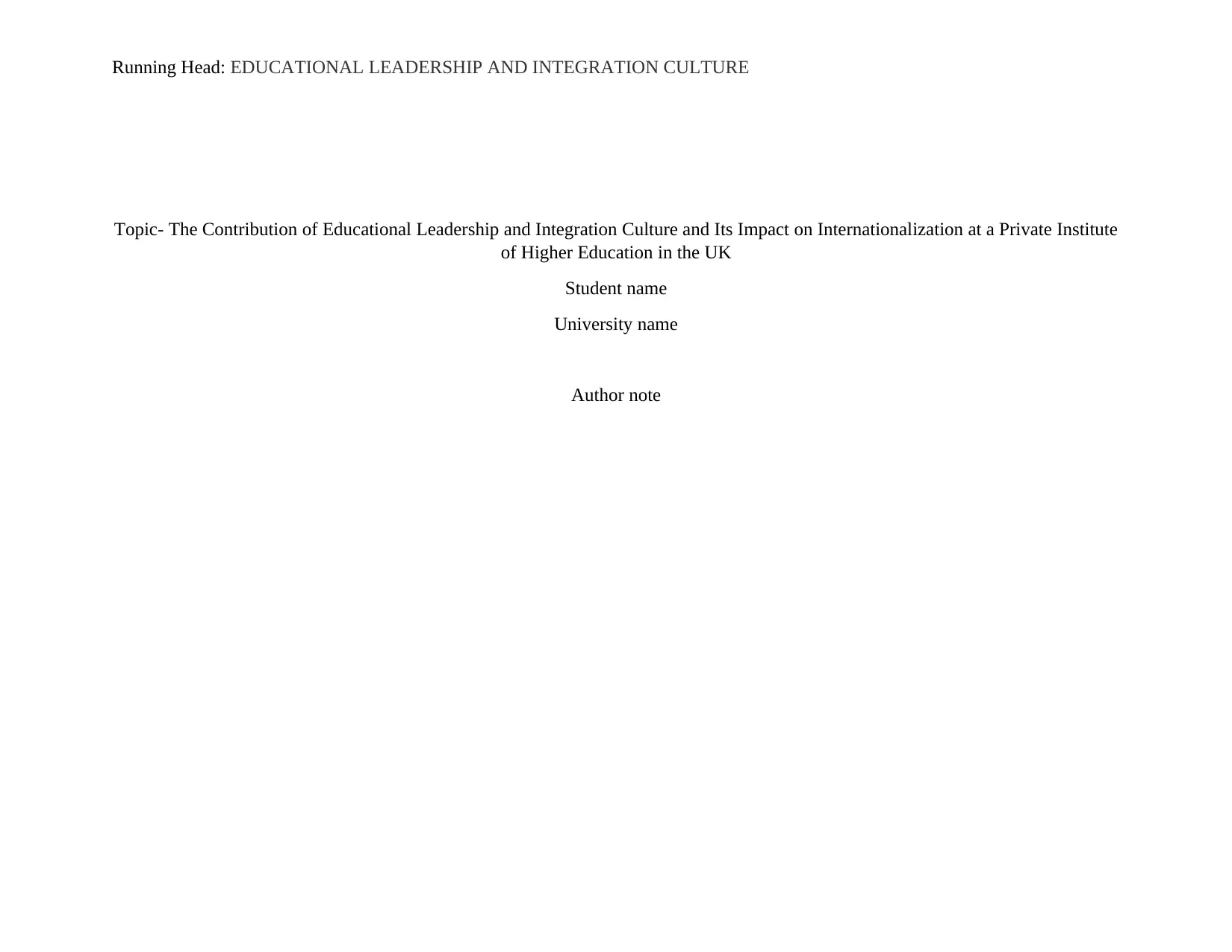
Running Head: EDUCATIONAL LEADERSHIP AND INTEGRATION CULTURE
Topic- The Contribution of Educational Leadership and Integration Culture and Its Impact on Internationalization at a Private Institute
of Higher Education in the UK
Student name
University name
Author note
Topic- The Contribution of Educational Leadership and Integration Culture and Its Impact on Internationalization at a Private Institute
of Higher Education in the UK
Student name
University name
Author note
Paraphrase This Document
Need a fresh take? Get an instant paraphrase of this document with our AI Paraphraser
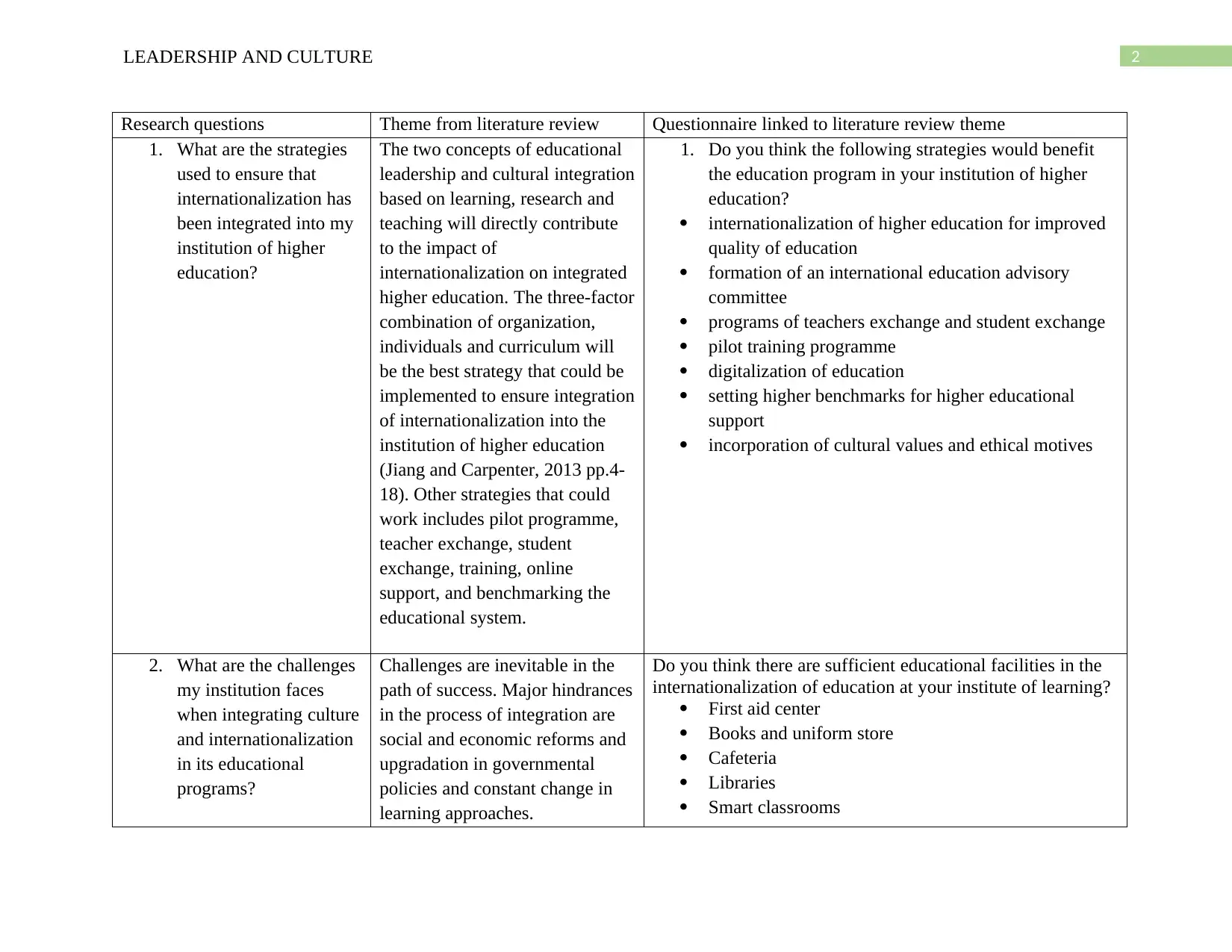
2LEADERSHIP AND CULTURE
Research questions Theme from literature review Questionnaire linked to literature review theme
1. What are the strategies
used to ensure that
internationalization has
been integrated into my
institution of higher
education?
The two concepts of educational
leadership and cultural integration
based on learning, research and
teaching will directly contribute
to the impact of
internationalization on integrated
higher education. The three-factor
combination of organization,
individuals and curriculum will
be the best strategy that could be
implemented to ensure integration
of internationalization into the
institution of higher education
(Jiang and Carpenter, 2013 pp.4-
18). Other strategies that could
work includes pilot programme,
teacher exchange, student
exchange, training, online
support, and benchmarking the
educational system.
1. Do you think the following strategies would benefit
the education program in your institution of higher
education?
internationalization of higher education for improved
quality of education
formation of an international education advisory
committee
programs of teachers exchange and student exchange
pilot training programme
digitalization of education
setting higher benchmarks for higher educational
support
incorporation of cultural values and ethical motives
2. What are the challenges
my institution faces
when integrating culture
and internationalization
in its educational
programs?
Challenges are inevitable in the
path of success. Major hindrances
in the process of integration are
social and economic reforms and
upgradation in governmental
policies and constant change in
learning approaches.
Do you think there are sufficient educational facilities in the
internationalization of education at your institute of learning?
First aid center
Books and uniform store
Cafeteria
Libraries
Smart classrooms
Research questions Theme from literature review Questionnaire linked to literature review theme
1. What are the strategies
used to ensure that
internationalization has
been integrated into my
institution of higher
education?
The two concepts of educational
leadership and cultural integration
based on learning, research and
teaching will directly contribute
to the impact of
internationalization on integrated
higher education. The three-factor
combination of organization,
individuals and curriculum will
be the best strategy that could be
implemented to ensure integration
of internationalization into the
institution of higher education
(Jiang and Carpenter, 2013 pp.4-
18). Other strategies that could
work includes pilot programme,
teacher exchange, student
exchange, training, online
support, and benchmarking the
educational system.
1. Do you think the following strategies would benefit
the education program in your institution of higher
education?
internationalization of higher education for improved
quality of education
formation of an international education advisory
committee
programs of teachers exchange and student exchange
pilot training programme
digitalization of education
setting higher benchmarks for higher educational
support
incorporation of cultural values and ethical motives
2. What are the challenges
my institution faces
when integrating culture
and internationalization
in its educational
programs?
Challenges are inevitable in the
path of success. Major hindrances
in the process of integration are
social and economic reforms and
upgradation in governmental
policies and constant change in
learning approaches.
Do you think there are sufficient educational facilities in the
internationalization of education at your institute of learning?
First aid center
Books and uniform store
Cafeteria
Libraries
Smart classrooms
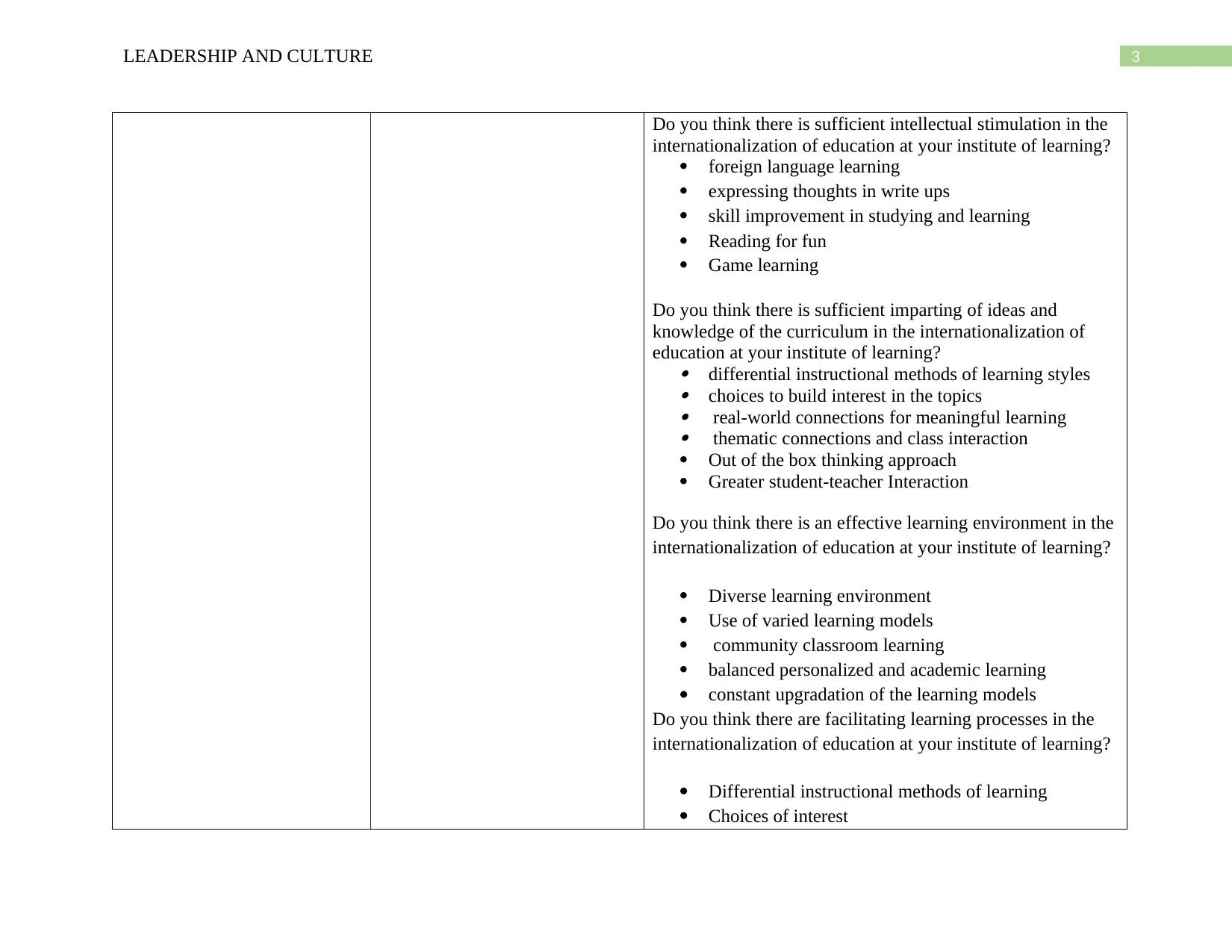
3LEADERSHIP AND CULTURE
Do you think there is sufficient intellectual stimulation in the
internationalization of education at your institute of learning?
foreign language learning
expressing thoughts in write ups
skill improvement in studying and learning
Reading for fun
Game learning
Do you think there is sufficient imparting of ideas and
knowledge of the curriculum in the internationalization of
education at your institute of learning?
differential instructional methods of learning styles
choices to build interest in the topics
real-world connections for meaningful learning
thematic connections and class interaction
Out of the box thinking approach
Greater student-teacher Interaction
Do you think there is an effective learning environment in the
internationalization of education at your institute of learning?
Diverse learning environment
Use of varied learning models
community classroom learning
balanced personalized and academic learning
constant upgradation of the learning models
Do you think there are facilitating learning processes in the
internationalization of education at your institute of learning?
Differential instructional methods of learning
Choices of interest
Do you think there is sufficient intellectual stimulation in the
internationalization of education at your institute of learning?
foreign language learning
expressing thoughts in write ups
skill improvement in studying and learning
Reading for fun
Game learning
Do you think there is sufficient imparting of ideas and
knowledge of the curriculum in the internationalization of
education at your institute of learning?
differential instructional methods of learning styles
choices to build interest in the topics
real-world connections for meaningful learning
thematic connections and class interaction
Out of the box thinking approach
Greater student-teacher Interaction
Do you think there is an effective learning environment in the
internationalization of education at your institute of learning?
Diverse learning environment
Use of varied learning models
community classroom learning
balanced personalized and academic learning
constant upgradation of the learning models
Do you think there are facilitating learning processes in the
internationalization of education at your institute of learning?
Differential instructional methods of learning
Choices of interest
⊘ This is a preview!⊘
Do you want full access?
Subscribe today to unlock all pages.

Trusted by 1+ million students worldwide
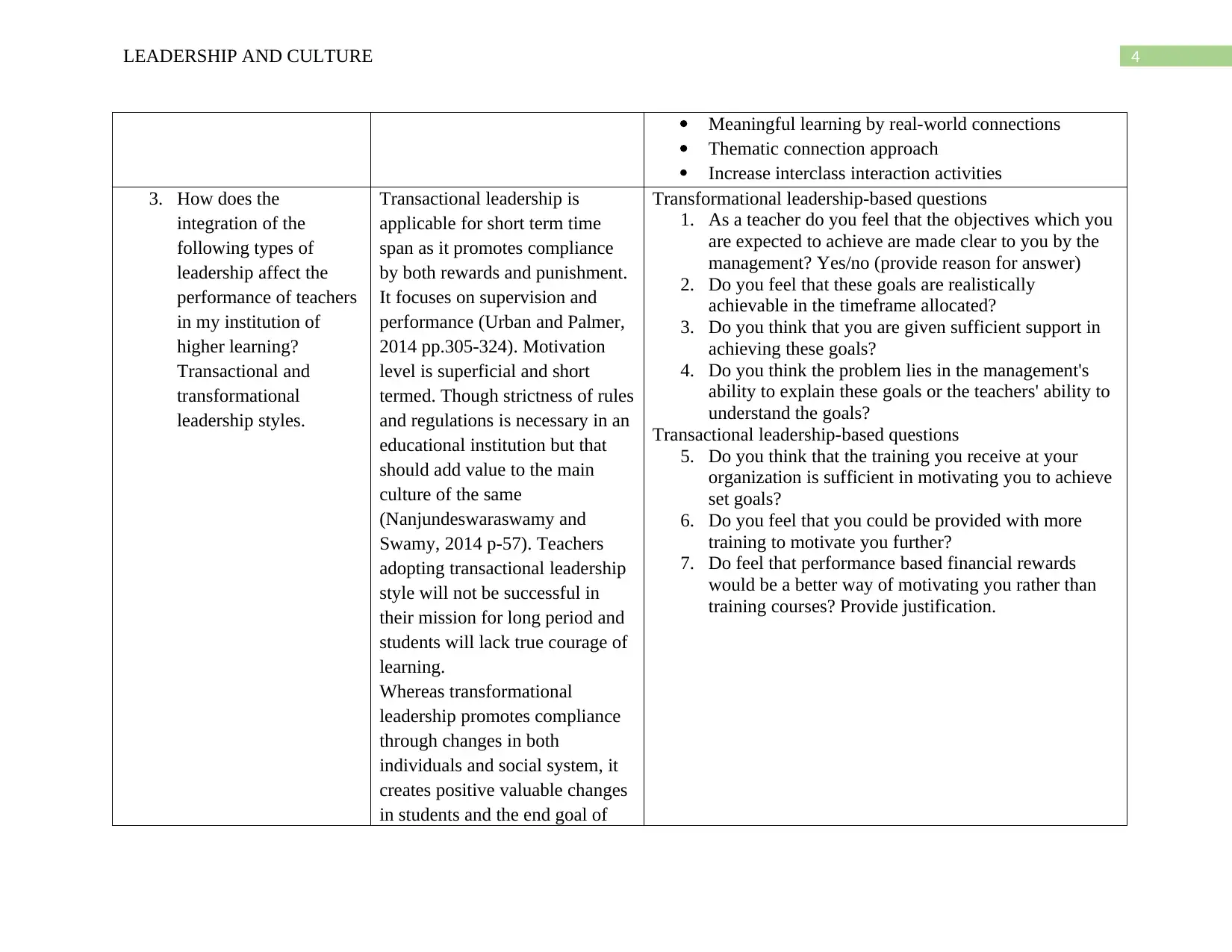
4LEADERSHIP AND CULTURE
Meaningful learning by real-world connections
Thematic connection approach
Increase interclass interaction activities
3. How does the
integration of the
following types of
leadership affect the
performance of teachers
in my institution of
higher learning?
Transactional and
transformational
leadership styles.
Transactional leadership is
applicable for short term time
span as it promotes compliance
by both rewards and punishment.
It focuses on supervision and
performance (Urban and Palmer,
2014 pp.305-324). Motivation
level is superficial and short
termed. Though strictness of rules
and regulations is necessary in an
educational institution but that
should add value to the main
culture of the same
(Nanjundeswaraswamy and
Swamy, 2014 p-57). Teachers
adopting transactional leadership
style will not be successful in
their mission for long period and
students will lack true courage of
learning.
Whereas transformational
leadership promotes compliance
through changes in both
individuals and social system, it
creates positive valuable changes
in students and the end goal of
Transformational leadership-based questions
1. As a teacher do you feel that the objectives which you
are expected to achieve are made clear to you by the
management? Yes/no (provide reason for answer)
2. Do you feel that these goals are realistically
achievable in the timeframe allocated?
3. Do you think that you are given sufficient support in
achieving these goals?
4. Do you think the problem lies in the management's
ability to explain these goals or the teachers' ability to
understand the goals?
Transactional leadership-based questions
5. Do you think that the training you receive at your
organization is sufficient in motivating you to achieve
set goals?
6. Do you feel that you could be provided with more
training to motivate you further?
7. Do feel that performance based financial rewards
would be a better way of motivating you rather than
training courses? Provide justification.
Meaningful learning by real-world connections
Thematic connection approach
Increase interclass interaction activities
3. How does the
integration of the
following types of
leadership affect the
performance of teachers
in my institution of
higher learning?
Transactional and
transformational
leadership styles.
Transactional leadership is
applicable for short term time
span as it promotes compliance
by both rewards and punishment.
It focuses on supervision and
performance (Urban and Palmer,
2014 pp.305-324). Motivation
level is superficial and short
termed. Though strictness of rules
and regulations is necessary in an
educational institution but that
should add value to the main
culture of the same
(Nanjundeswaraswamy and
Swamy, 2014 p-57). Teachers
adopting transactional leadership
style will not be successful in
their mission for long period and
students will lack true courage of
learning.
Whereas transformational
leadership promotes compliance
through changes in both
individuals and social system, it
creates positive valuable changes
in students and the end goal of
Transformational leadership-based questions
1. As a teacher do you feel that the objectives which you
are expected to achieve are made clear to you by the
management? Yes/no (provide reason for answer)
2. Do you feel that these goals are realistically
achievable in the timeframe allocated?
3. Do you think that you are given sufficient support in
achieving these goals?
4. Do you think the problem lies in the management's
ability to explain these goals or the teachers' ability to
understand the goals?
Transactional leadership-based questions
5. Do you think that the training you receive at your
organization is sufficient in motivating you to achieve
set goals?
6. Do you feel that you could be provided with more
training to motivate you further?
7. Do feel that performance based financial rewards
would be a better way of motivating you rather than
training courses? Provide justification.
Paraphrase This Document
Need a fresh take? Get an instant paraphrase of this document with our AI Paraphraser
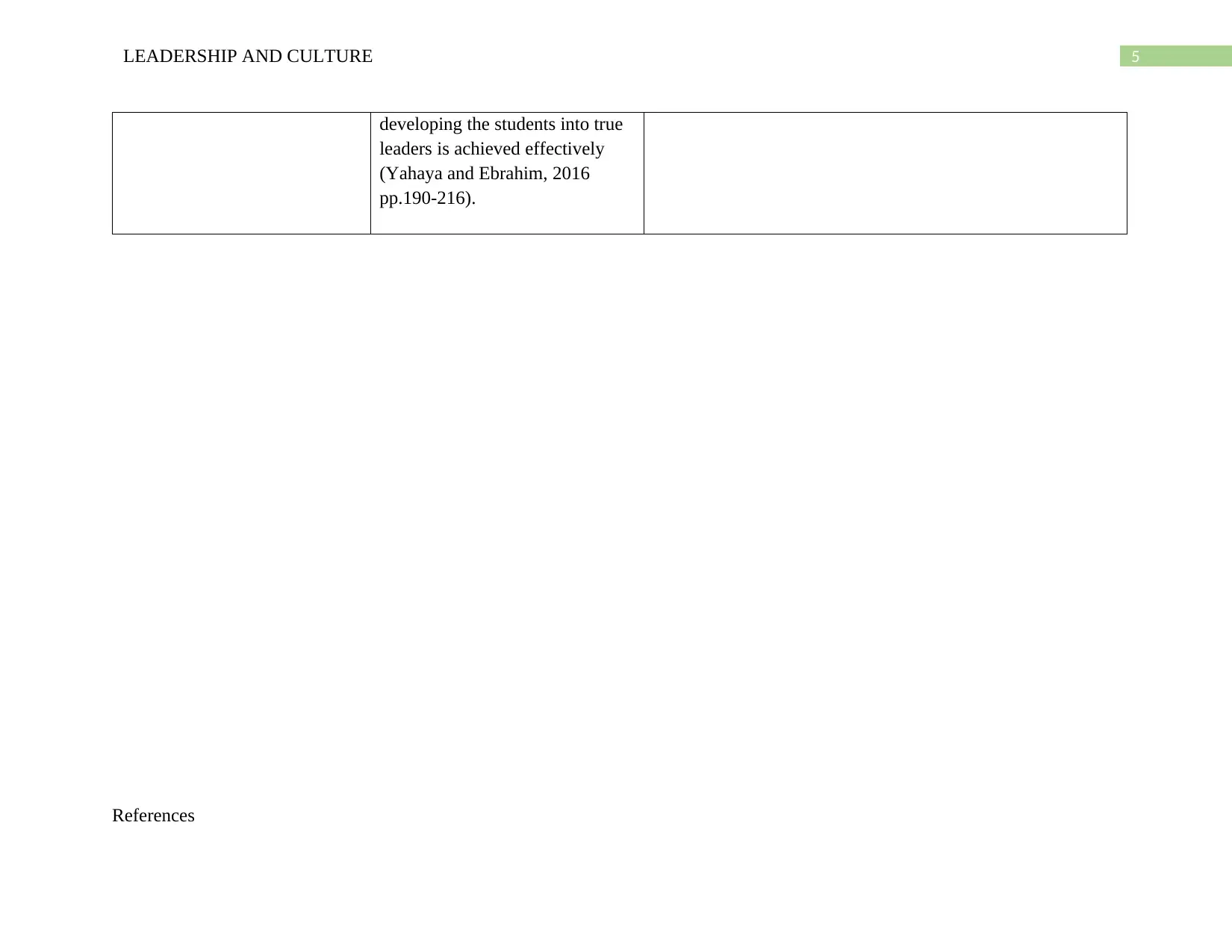
5LEADERSHIP AND CULTURE
developing the students into true
leaders is achieved effectively
(Yahaya and Ebrahim, 2016
pp.190-216).
References
developing the students into true
leaders is achieved effectively
(Yahaya and Ebrahim, 2016
pp.190-216).
References
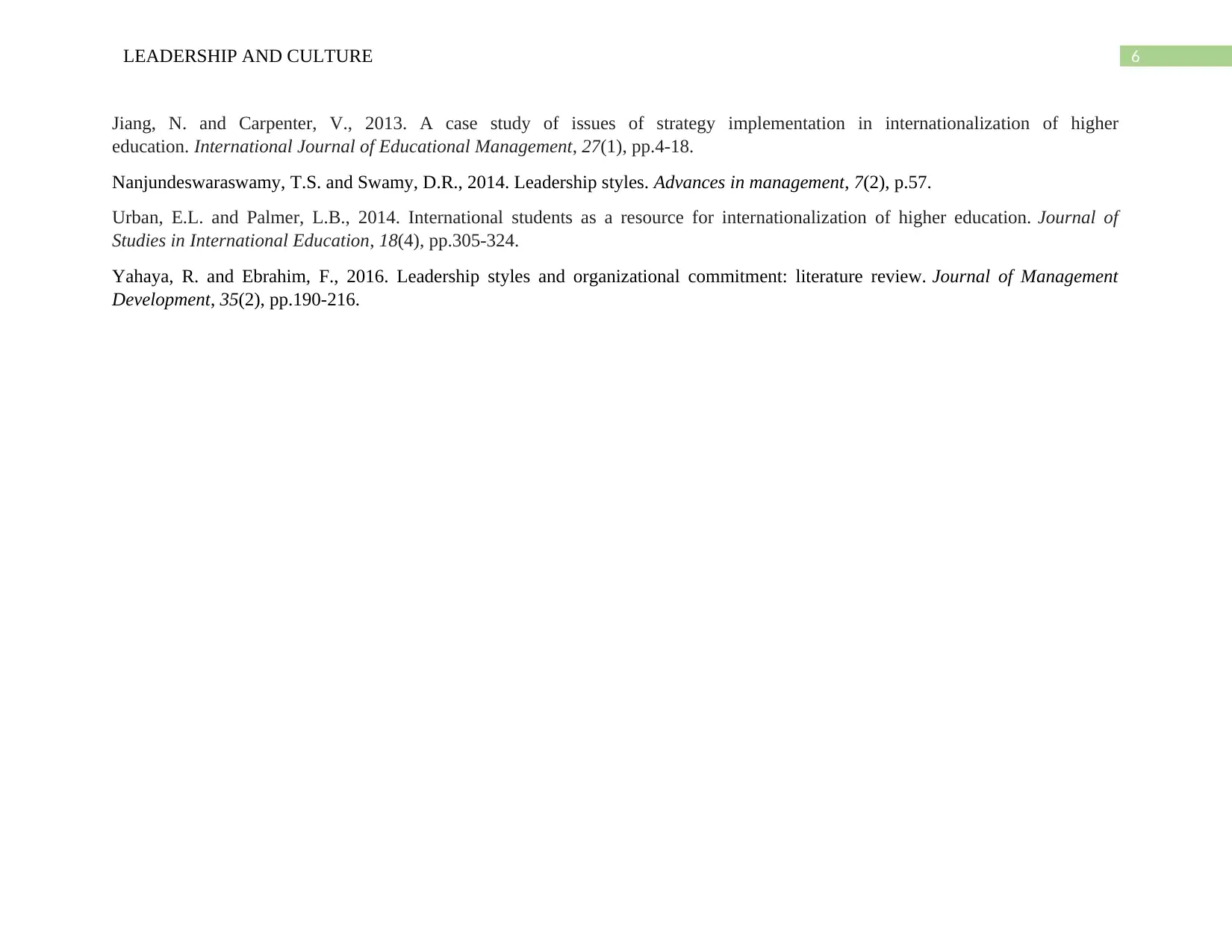
6LEADERSHIP AND CULTURE
Jiang, N. and Carpenter, V., 2013. A case study of issues of strategy implementation in internationalization of higher
education. International Journal of Educational Management, 27(1), pp.4-18.
Nanjundeswaraswamy, T.S. and Swamy, D.R., 2014. Leadership styles. Advances in management, 7(2), p.57.
Urban, E.L. and Palmer, L.B., 2014. International students as a resource for internationalization of higher education. Journal of
Studies in International Education, 18(4), pp.305-324.
Yahaya, R. and Ebrahim, F., 2016. Leadership styles and organizational commitment: literature review. Journal of Management
Development, 35(2), pp.190-216.
Jiang, N. and Carpenter, V., 2013. A case study of issues of strategy implementation in internationalization of higher
education. International Journal of Educational Management, 27(1), pp.4-18.
Nanjundeswaraswamy, T.S. and Swamy, D.R., 2014. Leadership styles. Advances in management, 7(2), p.57.
Urban, E.L. and Palmer, L.B., 2014. International students as a resource for internationalization of higher education. Journal of
Studies in International Education, 18(4), pp.305-324.
Yahaya, R. and Ebrahim, F., 2016. Leadership styles and organizational commitment: literature review. Journal of Management
Development, 35(2), pp.190-216.
⊘ This is a preview!⊘
Do you want full access?
Subscribe today to unlock all pages.

Trusted by 1+ million students worldwide
1 out of 6
Related Documents
Your All-in-One AI-Powered Toolkit for Academic Success.
+13062052269
info@desklib.com
Available 24*7 on WhatsApp / Email
![[object Object]](/_next/static/media/star-bottom.7253800d.svg)
Unlock your academic potential
Copyright © 2020–2026 A2Z Services. All Rights Reserved. Developed and managed by ZUCOL.





